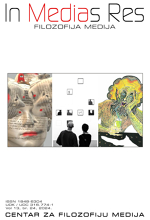Analiza internetskog diskursa u objavama članova Vlade na Facebooku
Analysis of the Internet Discourse in the Facebook posts by the Members of the Croatian Government
Author(s): Branka Šegvić, Iva PolićSubject(s): Media studies, Communication studies, Government/Political systems, Politics and communication, ICT Information and Communications Technologies
Published by: Centar za filozofiju medija i mediološka istraživanja
Keywords: Internet discourse; discourse analysis; social media; social network; Internet communication; political discourse;
Summary/Abstract: Considering that they combine the features of spoken and written language, social media networks present an important communication channel which politicians increasingly use nowadays in order to establish communication with the public. Social media networks enable direct communication between politicians and their audience, without the intervention of media. By using social networks such as Facebook, Instagram and Twitter, politicians have the opportunity to decide on the information and news they wish to share with the audience, and consequently on the development of their own public image and on the method of winning the affection of their voters. This paper analyses Facebook posts by the members of the Croatian Government. More precisely, it focuses on internet discourse features such as emojis, hashtags, tagged institutions, persons and locations used by Government members in their Facebook posts. It has been established that the most frequently used post format includes text and photos. Emojis are the most represented among the analysed internet discourse elements. They are followed by hashtags, tagged institutions and persons, while tagged locations are the least represented element. All analysed features appear more frequently in the Facebook posts by female Government members. National flags are the most represented emoji which is expected considering analysed corpus, and the use of hashtags varies depending on the department Government members are in charge of. Tagged locations also vary depending on the Government department. Most frequently tagged person is Andrej Plenković, and the most frequently tagged institution is the Government of the Republic of Croatia. The paper results show that just non-verbal internet discourse features are sufficient, and consequently, relevant part of the process of creating politicians’ public images and identities. Such features make the posts more dynamic and attractive, and thus impact the persuasive power of the politicians.
Journal: In Medias Res
- Issue Year: 13/2024
- Issue No: 24
- Page Range: 4017-4036
- Page Count: 20
- Language: Croatian

